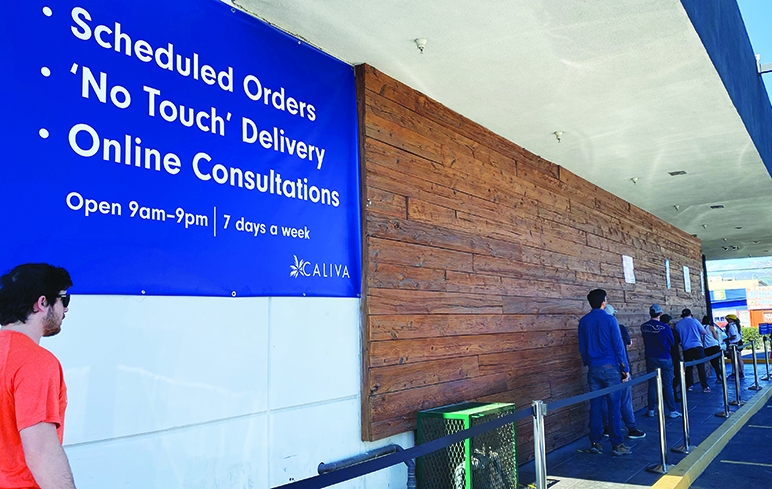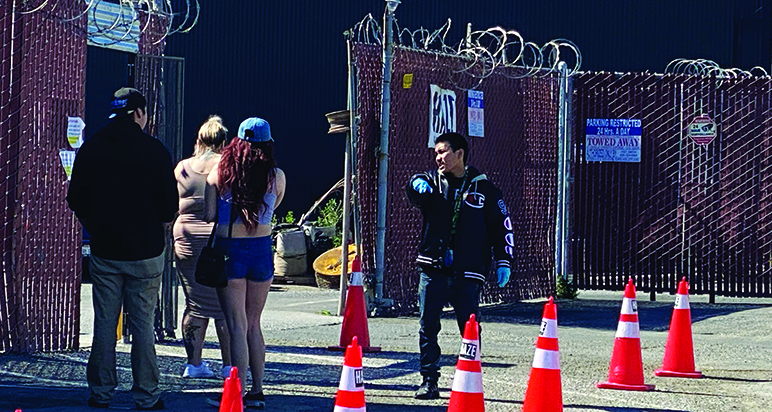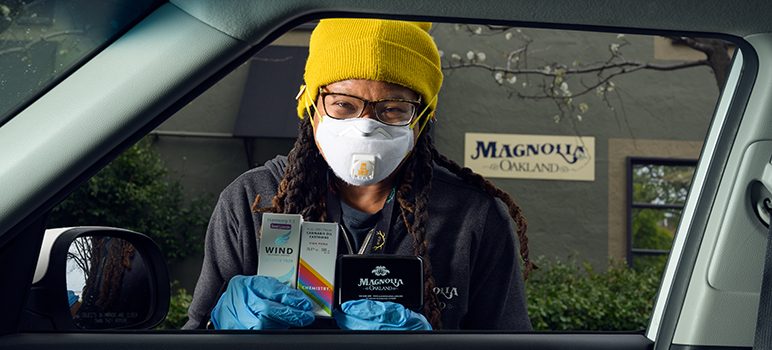When seven county health departments teamed up on March 16 to unveil California’s first shelter-in-place restrictions, their orders listed the industries exempted from closure as “essential businesses.” Cannabis dispensaries—even those selling products to people with a medical prescription—did not make the cut.
In San Francisco, the Department of Health quickly declared that “cannabis dispensaries and cannabis delivery services are not essential businesses,” causing minor panic, block-long lines, mob-like hoarding and widespread public backlash. Amid the uncertainty, dispensaries across the Bay Area made the decision to close their doors.
As officials in local counties rushed to interpret what really constitutes an “essential” business, dispensaries found themselves in a tense state of limbo. And because they serve both medical and recreational clients, there was ample room for interpretation.
“Especially during this anxiety-filled time for our community, cannabis is medicine,” Assemblyman Ash Kalra (D-San Jose) tweeted three days after Santa Clara County issued its public health order ordering business closures. “Both Medical & Adult Use customers should be able to access dispensaries in San Jose & throughout Santa Clara County, just as they would a pharmacy, during this difficult shelter in place period.”
San Jose’s dispensaries have been doing a brisk business soothing the valley’s frazzled nerves amidst social distancing requirements and county orders to limit on-site purchases to medical use only, while permitting recreational deliveries, an anachronistic distinction that devolves to California’s pre-legalization era.
“We’ve definitely seen an uptick in delivery sales recently,” said Caliva CEO Dennis O’Malley. “Typically our delivery business brings in about one-third of our company’s total sales, but over the course of the past month, we’ve seen this revenue model shift with delivery offerings now securing about two-thirds of our total income.”
The city of Oakland ordered its dispensaries closed, then reversed the closure. “By 9pm the night shelter-in-place was announced, the Oakland City Administrator’s office had already let dispensaries know they considered dispensaries essential businesses,” Magnolia Wellness’s Debby Goldsberry said. “The county was right behind them on this, doing the same the next day.”
Magnolia reopened less than two days later, after using its hiatus to implement nearly 100 procedures based on guidance from the U.S. Centers For Disease Control and Prevention (CDC) and the Occupational Safety and Health Administration.
Meanwhile, in San Francisco, Mayor London Breed swiftly caved to the immense public pressure and deemed cannabis essential with medical use.
In Santa Cruz County, which boasts the 25th-most dispensaries per capita in the nation, the Health Services Agency (HSA) was quick to deem cannabis dispensaries essential public services. The HSA decreed that they could in fact continue to serve clients — but with some game-changing and rather disruptive caveats.
“It was confusing at first,” said a budtender at Central Coast Wellness Center dispensary in the Santa Cruz mountain town of Ben Lomond. “We were closed for two days trying to figure out what was legal and not. There was a lot of anxiety about the situation.”
Then on March 18, Gov. Gavin Newsom issued a sweeping COVID-19 “shelter in place” edict for all California residents. To curb the spread of the pandemic, only vital and “essential” businesses or service providers—like grocery stores, gas stations, banks, pharmacies and media—were allowed to continue daily operations. There was no mention in the “shelter-in-place” order regarding cannabis dispensaries, or the cannabis industry as a whole. But a few days later, Newsom allowed cannabis retailers to continue operating as essential businesses under the medical facilities umbrella.
All across the Bay Area and California, the COVID-19 pandemic caused a rush of confusion for cannabis dispensaries as government officials issued edicts on how and even whether they can continue doing business, only to quickly reverse them in some cases. Late last week, the government of Berkeley issued an order that dispensaries there could offer delivery service only: no in-store shopping or even curbside pickup, as with other “essential” businesses. After a loud uproar from dispensary owners, the order was rescinded in less than a day.
Trying to keep up with the current rules for cannabis has been dizzying for consumers and dispensaries alike. “It’s reinventing the wheel for us, on a weekly basis,” said owner Kevin Watts of the Santa Cruz dispensary Surf City Original.

PATIENCE, PATIENTS: The Caliva mega-dispensary had lines on both sides of its building on Tuesday.
Everything Has Changed
Today, many cannabis shops are busier than ever, and the SF-based delivery service Eaze had its number of first-time deliveries and website sign-ups double almost overnight.
“There’s a weird mass hysteria going on now,” said Cole Hembree, owner of Felton’s Curbstone Exchange. “In the wake of the shelter-in-place order, we literally doubled our numbers. People are freaking out about COVID-19 and ordering more—in a stockpile-type scenario. We’re doubling our orders ... just to keep up with demand.”
Curbstone, known affectionately as “The Curb” by the cannabis dispensary’s regulars living in and around the mountain community north of Santa Cruz, is doing record-breaking business right now.
“People are getting freaking nuts,” Hembree said. “We’re seeing everyone stocking up. Even the people who’ve been with us for a long time. They are buying more than usual. People are buying the same things they usually do, just way more of them.”
It’s not just Curbstone that has been inundated by old and new customers. Demand is spiking, and shockingly strong, at dispensaries across the Bay Area, California, and the entire nation. Weed shops in Oregon, Washington, Colorado, and Alaska report huge numbers and substantial jumps in sales, new customers, and order amounts. On Wall Street, large and small cap stocks are being lifted skyward on a flurry of positive headlines and newfound enthusiasm for all things green.
It’s been a little over two years since weed began to go legal across the state of California. To date, commercial cannabis sales have raised more than $1 billion in taxes. The recreational cannabis market — one that was launched to much fanfare and with sky high expectations—got big quickly, but never quite reached the level that many had predicted. Brutal competition between the legal cannabis industry and the thriving black market has contributed to semi-sluggish recent growth, and the over-saturation of some key markets.
But now, thanks to the coronavirus, the Golden State is experiencing a cannabis explosion. A new wave of enthusiasm has taken over the cannasphere, and some in the weed biz are going so far as to declare a second “Green Rush.” California dispensaries report record growth—in some cases, numbers not unlike the first day of recreational sales. Some are ordering more products and increasing their inventory, hiring additional delivery drivers, and even hiring new employees.
“We’re killing it,” said Bruce Valentine, a budtender at the Santa Cruz Veterans Alliance.
The Alliance has been slinging what it calls the “highest-quality, lab-tested medical cannabis in existence” to ex-servicemen and the general public in the Santa Cruz area since 2011. In its almost decade-long existence, the dispensary has never experienced this kind of business.
The CDC may have inadvertently encouraged this new boom by strongly recommending the general public have at least a month’s supply of their medication. For cannabis patients, who smoke an average of a gram of flower each day, that’s around an ounce—costing anywhere between $200 for “schwag” to $400 for “top shelf” cannabis.
“People who are coming into the shop are definitely stocking up,” Valentine said. “Just like with water and soap. There definitely has been consistent traffic throughout the day. Roughly the same number of customers, just buying way more. Some people come in with gloves and masks on. It’s a huge change.”
Staying Clean
Dispensaries around the Bay Area are not only having to change their business operations to accommodate the new realities, but in some cases, dealing with confusion over how the new rules apply to them, and the looming danger that they might be changed at any time.
The situation briefly became dire for some dispensaries in Berkeley last week when Jordan Klein, the city’s economic development director, issued an order on Thursday evening directing all pot retailers to close their shops to customers, cease providing curbside pickup service, and offer delivery only. Some dispensaries, such as the Berkeley Patients Collective and Hi-Fidelity, don’t offer delivery service. They closed down entirely after the order was issued. They, along with several other dispensaries, mounted a major PR blitz on social media, and by Friday night, Berkeley had relented, just as San Francisco had done about a week earlier.
Nobody knew what to make of the situation. Berkeley provided little of its reasoning publicly. Klein said he issued the order after consulting with Dr. Lisa Hernandez, public health officer for the city, one of few in the state that has its own health department.
Dispensary operators said that since cannabis is deemed an essential service, there’s no reason it should be treated differently from grocers, restaurants, or pharmacies, all of which are allowed to serve customers either in-store or via curbside pickup. “We’re following the same CDC guidelines as every other business, said Sabrina Fendrick, director of government affairs for the Berkeley Patients Group.
BPG was beginning to offer delivery before the order was issued, but had the order stood, there would have been no way it could have made up for the lost business, Fendrick said.
“We’re scaling up as fast as we can, but getting cars, getting people trained—that all takes time. There’s a lot that goes into it.” She called the now-rescinded order “cruel,” especially to medical marijuana patients who, for example, can’t afford the minimum delivery amounts that most dispensaries require.
Airfield Supply, a large dispensary in San Jose, didn’t do many deliveries before the pandemic struck. When it did strike, the shop was able to quickly adapt, converting its sales floor into a staging area for pre-orders, curbside pickup, and delivery. To avoid pileups of customers, Airfield is texting pickup customers, allowing them to time their visits and avoid congregating near the door. It also reconfigured its Salesforce software to create a digital waiting list, allowing buyers already at the site to wait in their cars, away from other people, until their orders were ready.
Sales volume quadrupled in the first week. By the second week, sales were still high. At press time, Airfield spokeswoman Gretchen Giles said the situation in Santa Clara County is in such “terrific flux” that it’s hard to know whether local or county government might make changes similar to what Berkeley did.
Some dispensaries in the North Bay are dealing with a unique factor: tourism. People from across the country and the world descend on Sonoma and Napa counties to tour Weed Country as well as Wine Country — sometimes, it’s the same tour. Like dispensaries all over the state, Mercy Wellness in Cotati “observed a few days of surging sales in the run up to the shelter-in-place order, whereupon we shifted into curbside pickup and delivery as the exclusive methods for sales,” said Terry Garrett, the dispensary’s chief operating officer. But now, “we’re seeing our regular customers as usual, but almost no tourists,” Garrett added.
“We usually see customers from 5,300 Zip codes nationwide. All shoppers are local now.”
While many dispensaries such as Airfield saw increased sales after the stay-at-home orders were issued, those that don’t offer delivery have experienced the opposite. The Garden of Eden dispensary in Hayward is hoping to get delivery up and running soon, but for now, it’s reporting much lower sales volume. “Delivery is hard just from a logistical standpoint,” said Pamela Epstein, general counsel and chief regulatory and licensing officer of Eden Enterprises, which owns the dispensary.
“If we’re going to serve 500 to 1,500 customers a day, we’ll need a whole fleet of cars.” Speaking generally, she said many dispensaries are located in “undesirable locations” for offering delivery, because they don’t have the space for parking all the needed cars.
Garden of Eden is serving customers through curbside pickup, and is ramping up to enable pre-ordering and prepayment. But since an initial spike in sales, business has taken a big downturn, according to Eden Enterprises CEO Shareef El-Sissi. In the days after the state issued its stay-at-home order, people rushed to stock up in anticipation that they might not be able to buy cannabis for the duration of the crisis. At that point, El-Sissi said “volumes were unparalleled.” After cannabis was deemed “essential,” he said sales had nosedived, and he expected them to be down by about 25 percent, presumably because people are opting for delivery.

THOSE ARE REALLY BRIGHT, MAN: The Haze dispensary south of downtown San Jose used day-glo traffic cones to promote social distancing.
Back and Forth
Following the March 16 shelter-in-place order, officials in Santa Cruz County were quick to decree that customers could no longer enter the physical premises of any and all dispensaries, or “congregate or gather in a store.”
“We made a local decision to allow our cannabis businesses to continue operations while also trying to minimize contact,” writes Deputy County Administrative Officer Melodye Serino. “We are all in a very fluid and dynamic environment that calls for adaptive leadership at all levels in our community.”
To abide by the state’s social-distancing recommendations (a.k.a. the six-foot-rule) and to ensure the safety of workers and customers, the HSA instructed local dispensaries to immediately begin conducting sales through curbside pickup or delivery only. Santa Cruz County cannabis retailers had to adapt almost overnight, and dramatically change the way they conduct daily business.
With curbside ordering, customers place their orders online or over the phone, and a dispensary employee meets them outside the shop with their cannabis, and takes their payment. No browsing, perusing, smelling, handling, or in-depth consulting is involved.
County officials told local cannabis shops that they could only keep operating if they adhered to a laundry list of provisions, including rigid anti-congregation and social-distancing protocols, and ensuring that outside cannabis transactions occur under video surveillance or security officer supervision.
Khalil Moutawakkil, CEO of KindPeoples, the county’s largest and first state-legal dispensary, said he doesn’t blame county officials, but that he’d like to see them treat his business the same way they treat the area’s other retail businesses.
“The County of Santa Cruz deemed us to be ‘essential,’ but with additional restrictions that are not imposed on other retail businesses, like grocery stores or liquor stores,” Moutawakki says. “We feel blessed to remain open during this time of crisis, but we’d like to see some consistency.”
For 10 days under the curbside directive, business was good, customers seemed happy and things were running smoothly. Then everything changed again. Just over a week after Serino and Cannabis Licensing Manager Sam Loforti ordered all local dispensaries to conduct their business outside, they ordered them back in.
To “minimize contact” and adhere to “required security considerations,” Serino, Loforti, and the county announced that cannabis retailers would have to return to indoor sales by March 28. “During inspections, our staff have seen violations including large congregations out front of retail spaces—with no social distancing protocols being monitored or managed, awnings erected outside which may not allow for security surveillance, and even an ATM machine outside creating all kinds of security risks,” Serino wrote in a letter to local dispensaries.
But a number of employees and owners of Santa Cruz County dispensaries are not happy with the end of curbside pickup and having to constantly change the way they do business. A few say that eliminating curbside (and in-person ordering) will actually make things worse. Due to social distancing protocols, dispensaries will only allow one or two customers inside at a time. This could create a sizable backup outside dispensary doors.
“It was way more sanitary bringing the products outside or to a car. It was better for our employees—who wore masks and gloves—and it was safer for our clients. We were doing less harm, and had a lot less contact with curbside. You were in and out fast. Now though, the lines will be even longer,” said Curbstone’s Hembree.
Curbstone Exchange has been inundated with delivery requests. Hembree’s fleet of three delivery vehicles, and his team of dispatch operators are in constant motion, packaging and fulfilling orders throughout the county.
“Deliveries are full every day,” he said. “We’ve had to schedule deliveries for the next day. It’s not like you can’t get a delivery, but you may have to wait a little.”
3 Bros Santa Cruz has seen an explosion in delivery requests; in fact, until this week, 3 Bros had no designated full-time delivery drivers. But things are changing fast for the laid-back and Westside shop with the motto “Good Vibes, High Tides.”
“We’re doing more business than ever—close to 50 deliveries a day,” said 3 Bros budtender, Michelle. “Demand keeps getting higher; way more than before. Things are a bit better now that we have someone just doing deliveries. We need more time for deliveries though. We’re backed up.”
Grace Hase contributed to this report.


OH WOW MAN,
No food, no TP, no problem. No weed now that’s a problem. Honey I’m taken the Volvo wagon on a run to TJ. for my MED’s
Who gives a crappola about the availability of pot from dealers and pot dispensers. Apparently this is a very important issue to city leaders and sadly Gov. Newsom. We’ve got a Govenor who’s more worried about pot smokers than findinfg. a solution to stocking stores with necessities and essential items such as toilet paper, paper products, bread, and needed groceries. How simple minded is “our” Govenor. No food supplies, no toilet paper, but heck, smoke a doobie and everything will be ok.